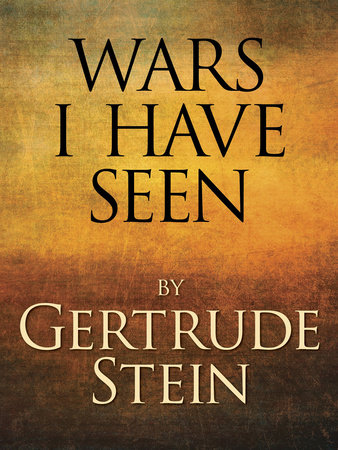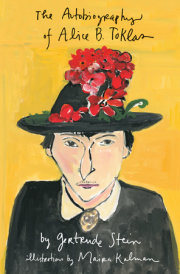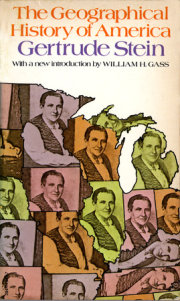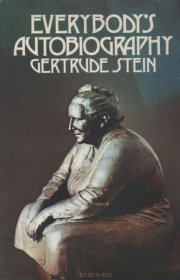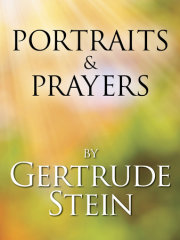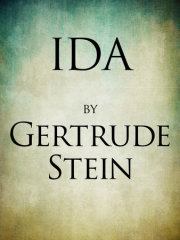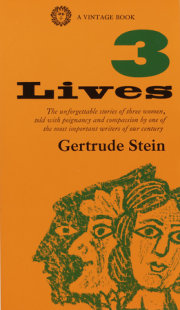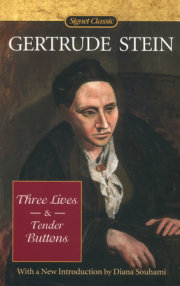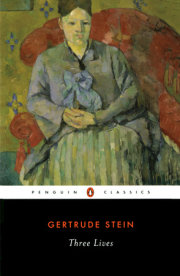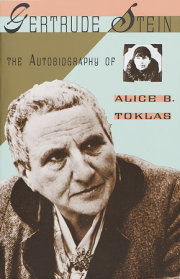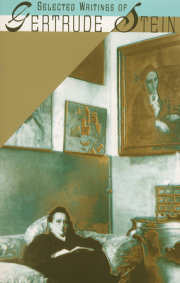I do not know whether to put in the things I do not remember as well as the things I do remember. To begin with I was born, that I do not remember but I was told about it quite often, I was not born during the night but about eight o’clock in the morning and my father whenever I had anything the matter with me always reproached me by telling me that I had been born a perfect baby. I do not know whether the four living and the two dead older children had not been born equally perfect babies at any rate my father never reproached them with it when there was anything the matter with them. Anyway though I could not remember it from the beginning there was no doubt that I was the youngest of the children and as such naturally I had privileges the privilege of petting the privilege of being the youngest one. If that does happen it is not lost all the rest of one’s life, there you are you are privileged, nobody can do anything but take care of you, that is the way I was and that is the way I still am, and any one who is like that necessarily liked it. I did and do.
The next thing I heard about myself was that I was eight months old. Of course I had been born in America, of course we were all of us born in America but all the same when I was eight months old we were not there. My uncle used to tell me about that. He was an art student in Germany, at that time, my mother’s family who were not rich although all born in America and were not people who liked business, even if their father was a tanner, but tanning is not really a business at least it was not in those days, it was a trade and so my uncle after my mother married my father was helped by my father to go to Germany to study sculpture. In those far away days, Americans went to Germany to study art particularly sculpture and then after that they finished in Rome. That was the way it was and we were all in Europe and I was eight months old and they left me in the arms of my uncle, why was never explained, but anyway I cried and ladies he knew came along and he did not like it. He was young then but I was so much younger that he did not like it. He often told me about that many years after.
The next thing that happened was that I was a very little older and we were in Vienna, a nice place then. And now there was something I could remember as well as some things I could be helped to remember by hearing them told again and again, then and later.
Born that way there is no reason why I should have seen so many wars. I have seen three. The Spanish-American war, the first world war and now the second world war.
There were of course a number of others that did not particularly concern me. The Boer war I remembered that one, the Japanese-Chinese war, and the Russian-Japanese war I remember that one very well too. Each one of these wars I remember for another reason. I suppose it is not so remarkable that I should have seen so many wars having seen a good many countries when I was a baby and having a feeling about countries which I suppose sooner or later since wars are make you be one of those that see them.
And so we were in Vienna and I have never seen it again but it has always remained for me something very real. It was there that I first came to be and so of course it was real and then there were really things, there was a public garden, a formal garden and in a kind of a way a formal garden pleases a child’s fancy more than a natural garden. It is more like a garden that you would make yourself. And there was music and there was the old emperor who was a natural figure to have in a formal garden and there was his national anthem and then there were the salt caves and then there were birds and butterflies and insects in the woods and there was the catching of them and there was good eating and on my third birthday a taste of Vienna beer. And there were my mother and my brothers on horseback and there was a Czech tutor, one did not realise how important all these nationalities were going to be to every one then and a Hungarian governess, and there was the first contact with books, picture books but books all the same since pictures in picture books are narrative. I have just bought twenty of them for the school children of Bilignin and they are narrative.
My mother so I heard them say at a later day did not like being in Vienna all alone with five children. She had had a sister from Baltimore with her, but she had gone away, my father had gone back to America on business and my mother said she wanted to be nearer America so she packed up and left the tutor and governess behind her and with the five children she went to Paris. I continued to be the youngest one. I was about four years old then and I do not know whether I really remembered more about Paris but I think I did. It always does make war because one of the things that seemed to me in 1914 was that Paris was then the way I remembered it when I was four only then there was no war. But war makes things go backward as well as forward and so 1914 was the same as 1878 in a way.
Of course there are a good many times when there is no war just as there are a good many times when there is a war. To be sure when there is a war the years are longer that is to say the days are longer the months are longer the years are much longer but the weeks are shorter that is what makes a war. And when there is no war, well just now I cannot remember just how it is when there is no war.
And then my mother had enough even in Paris of being away from America and all her family in Baltimore and my father going back to America to do business and so we all packed up, after having bought dozens of everything and we went to London and then to America. In London there was no war no war at all but the first theatre I ever saw, which was Pinafore and I do not remember it but I remember the hall of the theatre and I remember a glitter and I remember that one followed the other and that was all there was of London. The trip home on the boat I do not remember at all and I do not remember that any one ever said there was anything to remember. Up to that time such emotions as I had had expressed themselves in German and then in French and then in Baltimore although I do not think we stayed there very long emotions began to feel themselves in English. There was the one my mother told that there was one little Indian two little Indians three little Indian boys, four little five little six little seven little eight little Indian boys. And then also war obtruded itself, I do not quite know how but Baltimore was a place where when my mother was young there had been a war, and where she had seen the Yankee soldiers going from one station to another and they had been shot at and she remembered it and we remembered it and there was a mysterious uncle who went all through the war and came out with or without or only with or only without a pair of shoes and he was then in the shoe business and naturally there was a connection. It was only later when I was a passionate admirer of General Grant and the Northern army that I realised that the uncle had been in the Southern army.
After Baltimore we went to California and then I really did begin to remember. I naturally did remember, not all, but at least really some landscape as well as eating and moving. I do not remember that we saw Indians but I was told afterwards that we had, and now for almost a great number of years there was no war, there was history of course and there was the civil war which had been but otherwise there were no wars. Such wars as there were were inside in me, and naturally although I was a very happy child there were quite a number of such wars. Not many with anybody else because I was not quarrelsome and continuing being the youngest in the family continued being very well taken care of by everybody, also as being the youngest I had cajoling ways, one has when one continues to be the youngest.
In time of war you know much more what children feel than in time of peace, not that children feel more but you have to know more about what they feel. In time of peace what children feel concerns the lives of the children as children but in time of war there is a mingling there is not children’s lives and grown up lives there is just lives and so quite naturally you have to know what children feel. And so it being now war and I seeing just incidentally but nevertheless inevitably seeing and knowing of the feeling of children of any age I do not now have to remember about my feeling but just feel the feeling of having been a certain age. And so there was life in California from about six to sixteen, and as each thing happened it did happen. So many things happened but really in remembering not more than one or two a year certainly not one every month certainly not one every week certainly not one every day. Well say two or three a year. Quite enough too to remember because the rest of the time was just the rest of the time.
Copyright © 2013 by Gertrude Stein. All rights reserved. No part of this excerpt may be reproduced or reprinted without permission in writing from the publisher.

